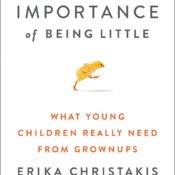THE IMPORTANCE OF BEING LITTLE by Erika Christakis (Book Excerpt)
From THE IMPORTANCE OF BEING LITTLE by ERIKA CHRISTAKIS, to be published on February 7, 2017 by Penguin Books, an imprint of Penguin Publishing Group, a division of Penguin Random House LLC. Copyright © Erika Christakis, 2017.
 PARENTAL ATTACHMENT
PARENTAL ATTACHMENT
Does parenting matter? Studies of identical twins raised apart seemed to put a damper on the idea that what we do for our children has much effect. Nonetheless, there is a lot of evidence that parents have a much bigger impact on their preschool-aged children than teachers do, and that pro- grams to support good parenting practices in vulnerable families pay off in the long run, especially in the early years. Some researchers estimate that as much as one third of the parenting gap we find between poor-quality and high-quality parenting could be closed by better support to families,27 which is at least equal to the fraction of the gap that could be closed by changes in preschools, as we saw earlier.
Too often, our perceptions and our policies treat children as if they exist in a vacuum. Political liberals are often loath to ask parents to take any responsibility for child-rearing choices because it appears to be a form of victim blaming. Voicing the belief that adults shouldn’t bring children they can’t support into the world is taboo in certain, mainly academic, circles. Conservatives, on the other hand, sometimes seem to want to foist all responsibility on parents, ignoring the larger societal stressors that make it so hard to meet children’s needs. But the research is clear that there are ways to close the so-called parenting gap between affluent and poor parents, and a more consistent effort to fund parenting and multi-generational family programs is an effective way to do it.
A parent’s relationship with his or her young child is so central to healthy development that it hardly seems to merit stating. Again and again, research has reaffirmed the importance of this bond.29 But to say that parenting matters is painting with too broad a brush. A good relationship between a parent and young child encompasses more than the one-to-one physical connection they share. While that is central, the relationship also embodies the early childhood habitat—or scaffold, to use our educational phrase—a parent helps to build for his or her child. That, too, is a central feature of the parent-child relationship.
To understand why this is so, we first have to explore something that puzzles parents and researchers alike: why, when parents face ever-greater demands on their time, do we feel we need to be such busybodies in our young children’s lives? More than ever before, we are in frantic overdrive to be with our children as much as we can, getting right down on the floor with the Legos; doggedly attending very soccer game, every parent- teacher conference, every dance recital, every karate practice; clocking more hours of quality time with children than in any previous generation.
It’s not uncommon for parents in competitive environments such as New York City to start the day at five a.m. to allow time for drilling their four-year-olds on pattern recognition in the hopes of securing a place in a magnet school or Gifted and Talented program—and that’s before putting in a full day of grownup work, too. In my suburban New England childhood in the 1960s, the only parents who made anything close to this kind of punishing effort were harboring realistic hopes of producing a professional hockey player.
Unbelievably, the absolute quantity of hours parents spend with their children has increased, too, according to some studies, with full-time employed mothers now spending more time with their children than 1960s housewives did! Why, then, if we’re spending so much time with our young children, are they having such trouble? There’s a kind of smug gotcha quality to the reporting on these time-use studies confirming how much more involved and committed today’s parents are compared to the prior generation. How could we possibly do more than we’re already doing?
And yet, deep down, don’t we also have a sneaking suspicion that at least some of this parent-child intensity might be a bit of a sham? When deciding whether we’ve adequately nurtured a young child, shouldn’t we shift the unit of analysis from number of hours in direct contact with a child to a fuller assessment of that child’s development? Does the child have room to make independent choices and take risks? Can he find ways to slake his natural curiosity? Is he talked to and listened to? Do we give him the space to be quiet with his thoughts and to experience life at a child’s pace? And on a more down-to-earth level: do little children get enough sleep and time to play?
Is it remotely possible that the mythical 1950s mom who tossed her kids outside to mess around in a slag heap while she lounged at the beauty parlor (summoning them back at sundown after she’d had her martini) might have been . . . wait for it . . . a better parent? Maybe we’ll find that when we look at a child’s whole habitat, we can abandon these unhelpful comparisons about how much time adults are spending directly with their children (which are demoralizing if you’re on the “bad parent” side of things, and inappropriately triumphant if you’ve logged the right number of hours on your time card).

(Phone credit: Andrea Reese)
Erika Christakis is an early childhood educator and school consultant. She was a faculty member at the Yale Child Study Center and is a Massachusetts-certified teacher (pre-K through second grade) and licensed preschool director. An honors graduate of Harvard College, she has advanced degrees from Johns Hopkins University, the University of Pennsylvania, and Lesley University’s Graduate School of Education. She has written about children for The Atlantic, The Washington Post, The Boston Globe, TIME.com, and the New York Daily News. She lives in New Haven, Connecticut. Visit http://www.penguinrandomhouse.com/books/318204/the-importance-of-being-little-by-erika-christakis/9780143129981/.















